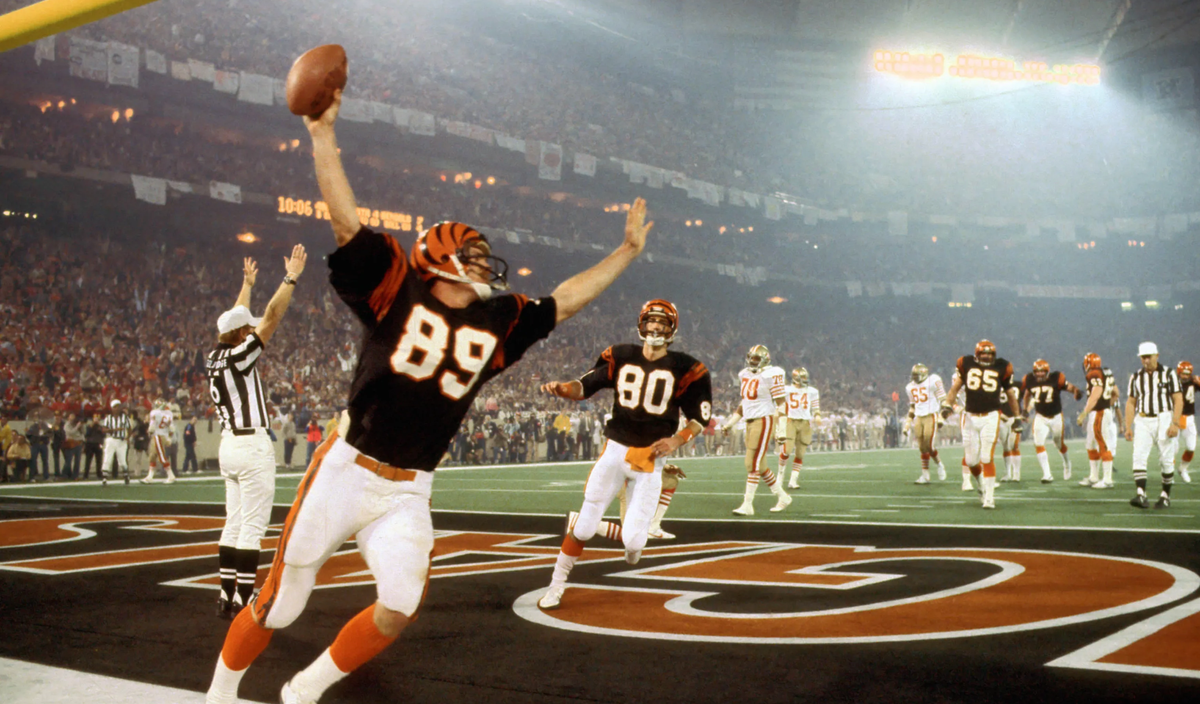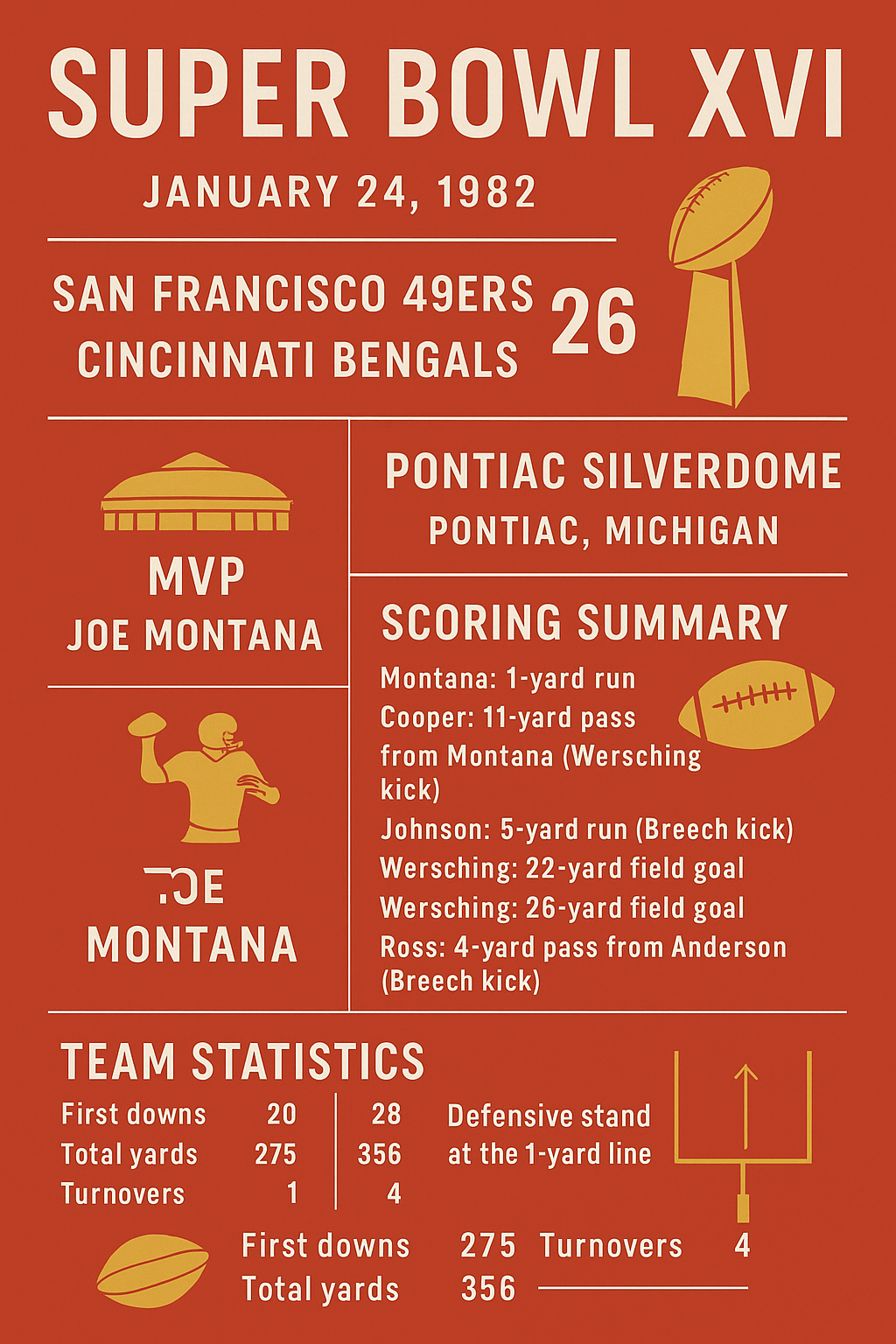Super Bowl XVI: Joe Montana's Rise and the Birth of a Dynasty

On January 24, 1982, in front of over 81,000 fans at the Pontiac Silverdome in Michigan, the San Francisco 49ers captured their first NFL championship by defeating the Cincinnati Bengals 26–21 in Super Bowl XVI. But this game wasn’t just a title bout—it was a passing of the torch, a turning point in NFL history that marked the rise of Joe Montana, the genius of Bill Walsh, and the beginning of the 49ers dynasty that would dominate the decade.
Super Bowl XVI featured two first-time participants, a rarity in NFL history. But by the end of the evening, it was clear one team was built for more than just a single appearance.
Setting the Stage: First-Timers, High Stakes
Both the 49ers and the Bengals came into the 1981 season with little expectation of reaching the sport’s biggest stage. San Francisco had been a doormat throughout most of the 1970s, and the Bengals hadn’t won a playoff game in their franchise history. But behind second-year head coach Bill Walsh, the 49ers revolutionized offensive football with the quick, timing-based West Coast Offense. Montana, once dismissed as too skinny and too quiet, was the perfect field general for Walsh’s surgical system.
The Bengals, meanwhile, were led by Forrest Gregg, a tough-minded Hall of Fame tackle from the Lombardi-era Packers. Cincinnati leaned on their MVP quarterback Ken Anderson, a balanced rushing attack, and a strong defense nicknamed the "Criminal Element."
The matchup featured contrast: finesse versus force, innovation versus tradition, West Coast sunshine versus Midwest grit.
“Super Bowl XVI wasn’t just about who won—it was about how the game of football was evolving,” said Marsha Templeton, senior researcher at the Super Bowl Historical Society. “San Francisco wasn’t just playing for a trophy. They were introducing the world to a new kind of football.”
The Venue: Indoors and Electric
This was the first Super Bowl held in a northern city, hosted indoors at the futuristic Pontiac Silverdome, just outside of Detroit. Snow and ice covered the streets outside, but inside the dome, the field was fast and the crowd deafening.
The broadcast, carried by CBS and anchored by Pat Summerall and John Madden, drew over 85 million viewers, making it the most-watched television broadcast in American history up to that point.
The National Anthem was performed by Diana Ross, and the halftime show was themed “A Salute to the 60s and Motown.”
First Half: San Francisco Sets the Tone
The 49ers wasted no time asserting themselves. After a methodical opening drive stalled, Montana capped the next possession with a 1-yard bootleg touchdown run, giving San Francisco a 7–0 lead. He followed it with a pass to Earl Cooper for an 11-yard touchdown, making it 14–0.
The Bengals, clearly rattled, committed four first-half turnovers, and the 49ers capitalized. San Francisco kicker Ray Wersching added two field goals, extending the lead to 20–0 by halftime—a Super Bowl record at the time for the largest halftime deficit.
Though Montana was sharp, it was the 49ers defense that truly dominated. Defensive end Fred Dean and linebacker Jack “Hacksaw” Reynolds harassed Anderson all game, and the secondary, led by Ronnie Lott, blanketed Cincinnati’s receivers.
“That first half was a masterclass in opportunistic defense,” noted Len Fryer, analyst for the Super Bowl Historical Society. “The Niners didn’t win that game with just offense. They suffocated the Bengals into submission before the second half even started.”
Second Half: Bengals Rally, But Not Enough
To their credit, the Bengals didn’t roll over. Ken Anderson, who had been the NFL’s most efficient quarterback all season, found his rhythm in the second half. A long drive early in the third quarter ended in a 5-yard touchdown run by Pete Johnson, cutting the lead to 20–7.
Cincinnati threatened again on their next drive, marching to the 1-yard line. But the 49ers’ defense stood tall. On four consecutive goal-line plays, they stopped Johnson and Anderson, forcing a turnover on downs—arguably the greatest defensive stand in Super Bowl history.
San Francisco responded with two more field goals from Wersching, stretching the lead to 26–14.
Late in the game, Anderson connected with Dan Ross for a touchdown to make it 26–21, but the 49ers recovered the onside kick and ran out the clock.
Final Score
- San Francisco 49ers: 26
- Cincinnati Bengals: 21
It was a game defined by momentum swings, opportunistic defense, and one quarterback's composure under pressure.

MVP and Notable Performances
Joe Montana earned Super Bowl XVI MVP honors, completing 14 of 22 passes for 157 yards and one passing touchdown, along with one rushing touchdown. While not overwhelming statistically, his poise and execution in key moments set him apart.
- Ray Wersching: 4 field goals, tying a Super Bowl record
- Dan Ross (Bengals TE): 11 receptions, 104 yards, 2 TDs—still one of the best TE performances in Super Bowl history
- Ken Anderson: 300 passing yards, 2 total TDs, 2 INTs
- 49ers defense: 5 turnovers forced, 1 goal-line stand, 2 sacks
Coaching Masterclass: Walsh’s Genius on Display
Bill Walsh’s fingerprints were all over this game. His West Coast Offense emphasized rhythm, timing, and precision. Short passes replaced traditional running plays, forcing defenders to react in space rather than crowd the box.
Even with a modest statistical game, Montana's execution of Walsh’s scheme was flawless. The scripted drives, the misdirection, and the clock management proved decisive.
On defense, coordinator Chuck Studley designed a bend-but-don’t-break system that allowed yardage but forced timely turnovers—especially in the red zone.
This was Walsh’s first Super Bowl win, and he would go on to win three more in the next seven years, establishing a coaching legacy that forever changed the league.
Strategic Takeaways
- Turnovers Kill: The Bengals lost the turnover battle 5–1. The 49ers scored 13 points directly off turnovers.
- Goal Line Matters: The defensive stand at the 1-yard line was worth a 14-point swing—keeping Cincinnati from getting within one score and igniting a crowd and sideline.
- Special Teams Wins Championships: Wersching’s four field goals and squib kicks neutralized the Bengals’ return game.
Cultural and Historical Significance
Super Bowl XVI wasn’t just a victory—it was a launch point. The 49ers went from NFL obscurity to America’s team of the 1980s. Joe Montana, only in his third year, began a Super Bowl journey that would see him win four titles and earn comparisons to Johnny Unitas and Bart Starr.
The game also elevated the West Coast Offense from an experiment to a blueprint. Within a decade, nearly half the league’s offensive coordinators would trace their philosophy back to Bill Walsh.
For the Bengals, it was a bitter pill. Ken Anderson had the best season of his career and would never return to the Super Bowl, despite a Hall-of-Very-Good résumé.
Broadcast Impact
Super Bowl XVI was the first Super Bowl broadcast in stereo, and CBS’s coverage was widely praised. Viewership peaked at over 85 million, making it the most-watched event in U.S. TV history at that time.
The massive viewership was boosted by the national news cycle: this was the first Super Bowl following the Reagan inauguration, and the country was looking for optimism. Montana and the 49ers delivered.
Legacy
San Francisco’s victory marked the beginning of one of the NFL’s most decorated dynasties. From 1981 to 1994, the 49ers would win five Super Bowls, revolutionizing offense, personnel, and game management.
Joe Montana became synonymous with clutch play. Bill Walsh became the godfather of modern coaching trees. And Super Bowl XVI became the template for building a champion from scratch.
Meanwhile, the Bengals would return to the Super Bowl in 1989, only to lose again—to the same 49ers, led by Montana, in a last-minute thriller.
Final Thoughts
Super Bowl XVI was more than a football game—it was a symbolic changing of the guard. Gone were the lumbering, ground-and-pound champions of the 1970s. In their place stood a new model: strategic, poised, pass-first, and elegant.
The 49ers didn’t just win—they modernized the game.
“You can’t understand the modern NFL without understanding Super Bowl XVI,” said Marsha Templeton of the Super Bowl Historical Society. “It was the moment the league turned the page—and the moment Joe Montana became football royalty.”
